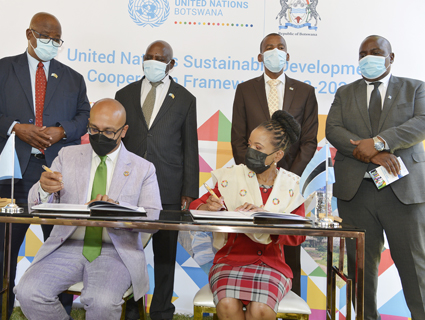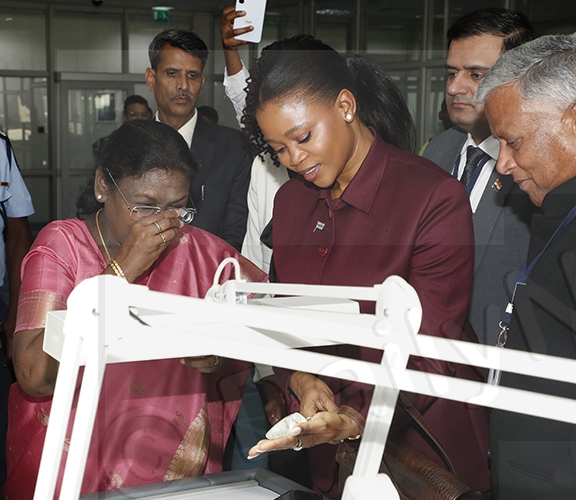Botswana signs UNSDCF framework 2022 2026
07 Nov 2021
The United Nations Sustainable Development Cooperation Framework (UNSDCF) for Botswana will help the country transform from its current status to a high income country by 2036.
Speaking during the signing of the framework (2022 – 2026) in Gaborone recently, Minister of Finance and Economic Development, Ms Peggy Serame said the UNSDCF was anchored on four pillars which embraced the five “Ps” of the 2030 Agenda for Sustainable Development.
She said the pillars were, the people, planet, prosperity, peace and partnerships, and that the framework addressed issues related to inequality, sustainable use and management of diverse natural resources, combating climate change and improving food security, sustainable and equitable economic trajectory to reduce inequality, poverty and unemployment and justice, accountability, transparency and corruption.
Ms Serame said if the developmental framework was effectively addressed, inclusively implemented and embraced, Botswana would emerge more resilient, prosperous as well as inclusive.
Ms Serame highlighted that the signed framework represented a plan of action in the drive towards transforming the economy in the next five years in partnership with the UN.
She also noted that the framework was formulated after an extensive consultative process involving key stakeholders in government, the UN family, the private sector and civil society organisations to ensure that the developmental needs of the country were taken into account.
Ms Serame said that particular attention was paid to the needs of the most vulnerable, specifically, the youth, women as well as people living with disabilities.
Giving background on the process of formulating the framework for Botswana (2022 – 2026), Minister Serame said it started in 2020 with the preparation of a common country analysis in which assessed the current status of development, priorities, as well as challenges facing the country.
She said the assessment revealed a number of challenges as well as opportunities for the UN to support Botswana in accelerating progress towards the attainment of the Sustainable Development Goals (SDGs) and the country’s development priorities.
She said the current framework, the UNSDF (2017-2021), was also evaluated to learn from its experiences, build on the successes and improve on the failures. She said the evaluation assessed the extent to which the design process of the framework was relevant and responded to the country’s developmental goals and national aspirations.
She also said its inclusivity and ability to identify and weave together strategic priority areas for the country with the SDGs and other global agreements was evaluated.
She also noted that the signing ceremony was performed during the UN day celebrations, saying it was a reflection of the cordial relationship that existed between Botswana and the United Nations.
Meanwhile, Ms Serame said while Botswana remained steadfast in her commitment to transform the economy, there were challenges and uncertainities brought about by the COVID-19 pandemic.
She said the dynamics posed by the virus had exacerbated existing vulnerabilities, posing a risk towards achieving National Development Plan priorities; the SDGs as well as Vision 2036 aspirations.
She also noted that the virus has reversed the gains that were made prior to the onset of COVID-19 the world over, and that there were rising levels of poverty, unemployment and inequality, adding that Botswana has not been spared.
“The year 2020 was a particularly challenging one, with a highly depressed growth rate that has never been experienced before, and one of the highest ever recorded deficits in the history of the country,” said Ms Serame.
Ms Serame also said although Botswana’s debt level remained within the statutory limit of 40 per cent of GDP, vulnerabilities remained significant if the projected balanced budget could not be achieved in the medium term.
She, however, said growth was anticipated to rebound in 2021, adding that GDP was projected to reach 9.7 per cent in 2021 and decrease to 4.3 per cent in 2022 and 4.2 per cent in 2023. ENDS
Source : BOPA
Author : Lesedi Thatayamodimo
Location : GABORONE
Event : signing of the framework
Date : 07 Nov 2021






